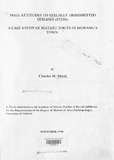Male Attitudes To Sexually Transmitted Diseases (STDS): A Case Study Of Matatu Touts In Murang’a Town
Abstract
Sexually transmitted diseases (STDs) are the commonest communicable diseases found in the world today and cause a world wide public health problem. They
This study looked at matatu touts towards STDs. These are young men who work within the matatu transport system. This business started in the early 1960's and has become a widespread phenomenon in Kenya today. Matatu touts compete to eke out a living in a congested and unsure or uncertain job market. A majority of the matatu touts are highly mobile. Their work involves moving from one place to another. This means that if they have sexual contacts in the various centres they visit, or in their residential areas, and contract STDs, they would spread it quite fast and far within a short period of time.
The major objective of the study was to explore the matatu touts' life style, attitudes to STDs, including AIDS and multiple-sexual relations. This would be to determine whether matatu touting is a risky business in the transmission of STDs including HIV.
To achieve the objectives of the study a baseline survey was conducted. A
sample of 98 touts was taken using the snowball method. A questionnaire was
used and the data obtained were analyzed using Stkt~Fical Package for Social Sciences (SPSS). Analysis involved frequency distribution, and cross- tabulation between the dependent and independent variables. Due to the nature of the study, direct observations and indepth interviews were incorporated and described in the analysis. Quantification has also been employed to validate some contentions made in the thesis.
The main findings of the study were that touts are a high risk group in the
transmission of STDs. Their nature of work involves traveling and exposes them to many female passengers.
They had a high knowledge on the common STDs, namely, Syphilis and gonorrhea. Over half of the touts had contracted an STD. They had they knowledge of AIDS
and how it is tra0smitted. However, paradoxically, they did not believe AIDS
exists.
The touts got their lady friends from the matatu they operated and also from the numerous stop overs they had. They were also involved in indiscriminate sexual unions and they were not scared of contracting an STD. They equated contracting an STD with catching a common cold, which in most cases than not was not taken seriously.
It is recommended that peer groups and religious organizations be used to educate the youth on their sexuality. Additionally their attitudes to STDs, and more especially to AIDS, have to be changed if the STD cases have to be brought down.
Citation
A Thesis Submitted to the Institute of Mrican Stud~n Partial fulfilment for the Requirements of the Degree of Masters of Arts (Anthropology), University of Nairobi.Publisher
Department of Arts

